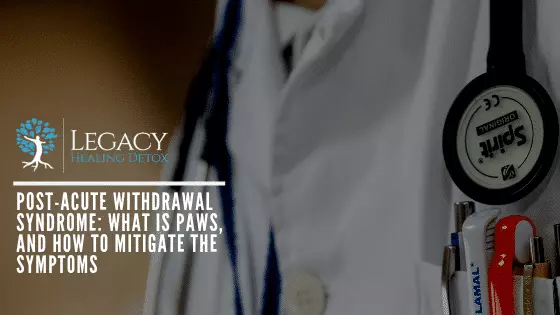
Post-Acute Withdrawal Syndrome: What is PAWS, And How to Mitigate The Symptoms
Legacy Healing Center Blog
Post-Acute Withdrawal Syndrome, or PAWS, is a condition comprised of a wide range of symptoms experienced by individuals, after cessation, who have struggled with prolonged drug use. The severity of PAWS is dependent upon the severity and level of damage to the individual’s nervous system during the course of substance abuse. Typically, this condition occurs after the initial acute withdrawal symptoms have passed. PAWS can peak around 6 months into sobriety for some, and last up to almost two years for others. Post-Acute Withdrawal Syndrome tends to last the longest for the most extreme, long-lasting cases of addiction and especially for those over the age of 50.
PAWS is a direct result of the rapid fluctuation of an individual’s brain chemistry, after an individual stops abusing drugs/alcohol. During the peak of active addiction, the brain adapts to the changes in neurotransmitters and the influx of feel-good chemicals. The spike in neurotransmitter activity excites the brain – and sets the standard at a much higher rate to achieve feelings of “normalcy.” Once the substance is taken away, a comedown is unavoidable and ultimately inevitable, thus leaving the brain to feel as though it is not operating at “normal” functioning levels.
Factors Associated with Post-Acute Withdrawal Syndrome
PAWS typically occurs once there is a period of abstinence and once the initial withdrawal symptoms subside. There are a number of factors that contribute to the severity of PAWS which may include:
- Type of Substance Abuse (Alcohol, Benzodiazepines, Opioids, Stimulants)
- Genetic Factors
- Age
- Psychological Predispositions (Co-occurring Disorders)
- Length of Time of Misuse
- Underlying Physical Ailments or Conditions
- Severity of Substance Abuse
10 Symptoms of Post-Acute Withdrawal Syndrome
There are a variety of symptoms correlated with PAWS that are specific to each individual substance abused. Here are some of the most common symptoms, universally associated with PAWS and not specific to any particular drug:
Abnormal Sleep Patterns
Sleep disturbances are probably the most common of one of the most frustrating symptoms of PAWS. The inability to fall or stay asleep is extremely common. The individual may find his/herself waking up multiple times throughout the night or quite the contrary – sleeping in excess, sometimes for days at a time.
Foggy Memory/Thinking
Oftentimes an individual, recovering from addiction, may have trouble with processing thoughts, concentration, problem-solving, impulsivity, and memory loss.
Mood Swings
Emotional instability is a natural byproduct of PAWS. Individuals may experience periods of mania, depression, anxiety, paranoia, and even complete dissociation during post-acute withdrawal. Oftentimes, the recovering individual may have extreme feelings of impending doom, unwanted thoughts, heart palpitations, overreacting, under-reacting, and even extreme sensitivity to stress. Mood swings may last for a couple of days or even a couple of weeks.
Lack of Physical Coordination
Most of the physical symptoms of withdrawal are eliminated after the initial post-acute withdrawal period. However, some individuals may continue to struggle with fine motor skills, coordination, reflexes, and even balance.
Cravings
The most common and seemingly difficult to overcome symptom of PAWS is the cravings that an individual may feel during PAWS. An individual may have feelings of utter desperation and the inability to survive without the substance. This mental craving can induce a physical reaction such as sweating, anxiety, shaking, and the inability to focus on anything other than obtaining the substance desired.
PAWS is Only Temporary
Although PAWS can be super frustrating and seemingly impossible to deal with, this is all a part of the recovery process. The length of time is dependent on the severity and length of time the substance abuse. The brain is in the process of healing during this time and trying to adapt by achieving homeostasis and balance within itself. As time goes on, the symptoms of PAWS will lessen in severity and this is a small part of your recovery process over the innumerable amounts of benefits that come along with maintaining long-term sobriety. If you are struggling with PAWS, here are a few suggestions that can help mitigate the symptoms:
- Proper Nutrition – A balanced diet is quintessential for managing the symptoms of PAWS. (less sugar,fat, caffeine and more water, fruits, vegetables)
- Exercise – There is a ton of research that has proven that regular physical activity can help reduce PAWS and relieve tension while improving overall mental/physical health.
- Establish a Strong Support System- It’s always a good idea to surround yourself with a strong support and with friends, family, your sponsor, and other supportive people that you trust. This is one of the most vulnerable times during your recovery.
- Find Balance – Implementing balance and stability in your life is one of the best ways to mitigate symptoms of PAWS.
